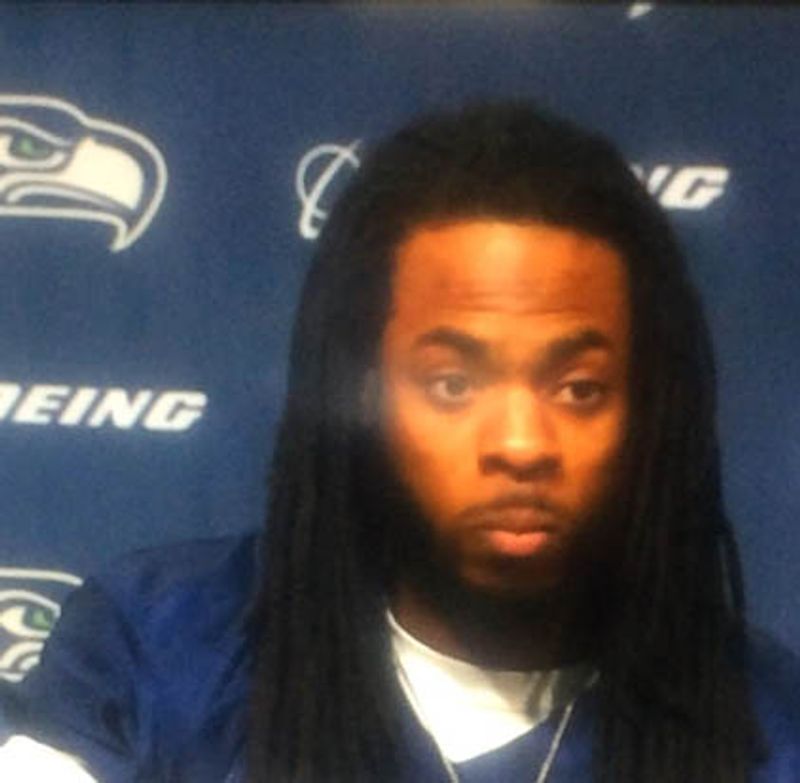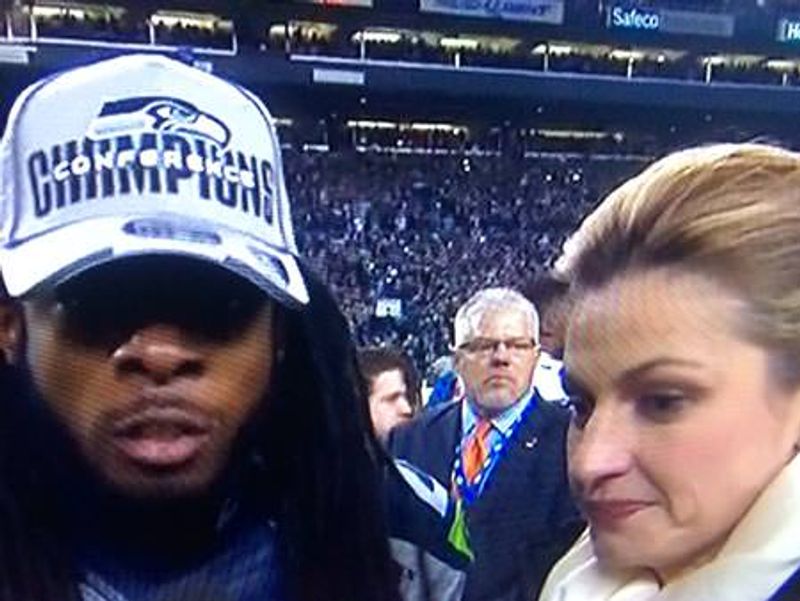Blog
Seahawks’ Richard Sherman offended by word “thug,” but Justin Bieber probably digs it
I don’t know whether Justin Bieber, driving his rented yellow Lamborghini, saw himself as a thug, but his arrest for alleged DUI and drag racing in Miami certainly makes him “thug-like,” and with a newly minted record, he is definitely more than a “wannabe.”

Notice how race never comes up in discussing his “thuggy-ness.”
On the other hand, Seattle Seahawks’ defensive back Richard Sherman, heading to the Super Bowl, doesn’t like any mention of the word “thug” in relationship with his now notably infamous behavior. In fact, Sherman implies that anyone calling him “thug” is using the new euphemism for the “N” word.

Really. Well, you can add a third definition to the word that historically was an Asian slur from Sanskrit.
A google search reveals this definition:
thug
noun
synonyms: ruffian, hooligan, vandal, hoodlum, gangster, villain, criminal;
informal: tough, bruiser, hardman, goon, heavy, enforcer, hired gun, hood
“one of Capone’s thugs”
a member of a religious organization of robbers and assassins in India. Devotees of the goddess Kali, the Thugs waylaid and strangled their victims, usually travelers, in a ritually prescribed manner. They were suppressed by the British in the 1830s.
Origin
early 19th cent. (sense 2): from Hindi thag ‘swindler, thief,’ based on Sanskrit sthagati ‘he covers or conceals.’
- a violent person, esp. a criminal.
- historical
In fact, usage of the term “thug” has nearly doubled from its heyday in the 19th century. And now Sherman wants to put race back in a deracinated term.
The national discussion over the ethnic use of “thug” is now on the race agenda ever since Sherman, the Stanford communications grad, held a “not so mea culpa”-style press conference Wednesday to explain his post-game NFC Championship interview that went viral.
In the final moments of the game, Sherman batted away an end zone pass to San Francisco 49er wide receiver Michael Crabtree, in a play that earned the Seahawks a trip to the Super Bowl.
Game over. Time to turn the “bad-ass” switch off.
But in his post-game interview, Sherman didn’t switch to “media conference public persona.” He continued to play his typical trash-talking game, denouncing Crabtree and calling himself the best defensive back in the game.

Of course, Sherman likes to think of himself as somewhat akin to boxing icon Muhammad Ali, who as Cassius Clay dared to proclaim “I must be the greatest” after his upset of Sonny Liston. But that’s a bad analogy. Clay, while a menace to Liston, could never be conceived as villainous by the public. Indeed, for all of Clay’s braggadocio, there was a certain style and charm. Toss in the mention of God, and Clay had a saving touch of humility.
None of that can be said of Sherman’s post-game interview.
Even with the sound turned off, the image of that interview spread as an internet meme and looks bullying and unfriendly. There’s Sherman in dreadlocks giving a verbal tongue-lashing to the audience as wide-eyed blonde reporter Erin Andrews braces herself during the taunting.
If there’s any latent racism in society today, it all came to the surface when people saw that interview.
That’s not Sherman’s fault. But he had a choice in how to act, and he chose to provoke.
True, Sherman did nothing illegal, but it did cross the line when it comes to sportsmanship.
At this week’s press conference, Sherman admitted he could have done it differently and that it was all said in the throes of passion.
There was, however, enough time so a mature Stanford grad of 25 could compose himself and not glare and scream menacingly, as he got a chance to spread exactly how he felt to the 55 million viewers who watched the game at home.
I didn’t see Sherman’s act as racial in any way and did describe it as “thuggish” in a post on my website,www.amok.com.
It’s the same word I used to describe any kind of bad behavior. Race? Never entered into my mind.
Until Sherman brought it up.
It’s just too bad that in our pop culture, especially in so-called “gangsta rap,” a kind of tough-guy misogynist and menacing behavior is often seen as cool. Oh, and saying the “n-word” too.
If there are racists out there hijacking innocent non-racist language and using it as cover for racism, or as racist code, then we need to look at each individual use and intent, case by case.
I used thug in its deracinated way, not in its original Asian, and definitely not as a slur against African Americans.
But being reasonable and not a racist, I will respect an individual’s feelings.
Sort of like the use of the “redskin” term. If one finds it offensive, we can disagree about its use. But how it makes Native Americans feel really shouldn’t be debatable.
This process may not work with typical garden variety racists out there. But what if the rise of the use of the word “thug” is really due to racial stereotypes of criminal behavior? It’s worth pausing before using in general.
If it offends Sherman, so be it.
I’ll simply describe him as being a “poor sport” and “lout.”
Lout? Uncouth, aggressive. And race-neutral.
For those terms, shutdown corner Sherman has a weak defense.
I will say that at least Sherman was consistent in his press conference. When it comes to Asian Americans, Sherman showed uncommon sensitivity to an unintentional slur used in everyday speech.
In describing Bronco quarterback Peyton Manning’s ability to find weaknesses in a defense, Sherman referred to it as Manning finding the “crack in the armor.”
ESPN, when covering Jeremy Lin, knows exactly how sensitive people can get over the more common version of that phrase, in which the offensive word rhymes with “dink.”
Of course, Sherman’s use of the word crack no doubt excited the Mayor of Toronto.
But we all know what a lout that guy is.

Emil Guillermo is an independent journalist/commentator. Updates at www.amok.com. Follow Emil on Twitter, and like his Facebook page.
The views expressed in his blog do not necessarily represent AALDEF’s views or policies.
Read Emil's full bio →